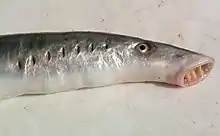Agnatha
See also: agnatha
Translingual

Agnatha, such as this lamprey, are distinguished by the lack of a jaw.
Etymology
From Ancient Greek ἀ- (a-, “without”) + γνάθος (gnáthos, “jaw”).
Proper noun
Agnatha
- The jawless fishes, or agnathans
- A taxonomic superclass within the subphylum Vertebrata.
- 1889, Edward Drinker Cope, "Synopsis of the Families of Vertebrata", The American Naturalist, volume 23, page 852:
- The known members of the class Agnatha are a very small representation of those that once existed; and they present a great variety of character, having little affinity with each other.
- 2007, Chad Thomas et al., Freshwater Fishes of Texas, Texas A&M University Press, page 6:
- Current classification schemes have living fishes assigned to two superclasses (Agnatha, or jawless chordates, and Gnathostomata, or jawed chordates)[…].
- 1889, Edward Drinker Cope, "Synopsis of the Families of Vertebrata", The American Naturalist, volume 23, page 852:
- A taxonomic infraphylum within the subphylum Vertebrata.[1]
- A taxonomic superclass within the subphylum Vertebrata.
Hypernyms
- (superclass): Animalia - kingdom; Eumetazoa - subkingdom; Bilateria, Nephrozoa - clades; Deuterostomia - superphylum; Chordata - phylum; Chordata Craniata - clade
- (infraphylum): Eukaryota - superkingdom; Animalia - kingdom; Bilateria - subkingdom; Deuterostomia - infrakingdom; Chordata - phylum; Vertebrata - subphylum[1]
Hyponyms
- (subphylum): Myxini, †Cephalaspidomorphi, †Pteraspidomorphi - classes
- (infraphylum): Cyclostomata[1]
Coordinate terms
See also
- Ostracodermi
References



- Hyperotreti at the Tree of Life Web Project
- Agnatha at Fossilworks
- Ruggiero MA, Gordon DP, Orrell TM, Bailly N, Bourgoin T, Brusca RC, et al. (2015) A Higher Level Classification of All Living Organisms. PLoS ONE 10(4): e0119248. doi: 10.1371/journal.pone.0119248. pmid:25923521
This article is issued from Wiktionary. The text is licensed under Creative Commons - Attribution - Sharealike. Additional terms may apply for the media files.